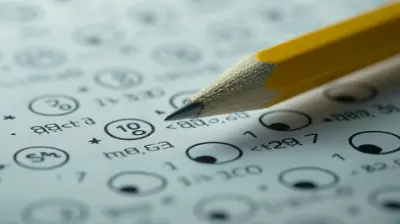The Importance of Taking Breaks During Study Sessions
4 August 2025
Let’s be real—you’ve been nose-deep in textbooks or staring at that screen for hours trying to cram everything from algebra formulas to historical dates. It’s tempting to pull off those marathon study sessions, especially when exams are looming. But here's the thing: your brain isn't a machine. Even machines overheat, right?
Taking breaks during study sessions isn’t just about stretching your legs or grabbing a snack (although that’s a great part of it). It’s about giving your brain the space it needs to actually absorb, retain, and understand what you're learning. So, if you're still powering through without pressing pause, this article is your wake-up call. Let’s dive into why breaks are essential and how they can actually make you a smarter, more efficient learner.
Why Your Brain Needs Breaks
Here’s a fun fact: your brain isn’t designed to focus intensely for hours on end. Yep, even the most studious among us hit a cognitive wall eventually.The Mental Fatigue Problem
Imagine pouring water into a sponge. At first, it soaks it all up. But eventually, it gets saturated. That’s what happens to your brain when you study nonstop—it gets overloaded. Mental fatigue sets in, and your ability to process and retain information plummets.Taking breaks is like wringing out that sponge, giving it space to absorb more again. Without breaks, you're essentially trying to pour more knowledge into an already saturated brain. Not ideal, right?
Memory & Retention
Your brain needs time to process information. Studies have shown that taking short breaks can actually help solidify what you’ve just learned. Think of it like cooking: you can’t keep pouring ingredients into a pot without letting it simmer for a bit.Breaks give your memory center—aka the hippocampus—a chance to store and organize what you’ve learned so far.
The Science-Backed Benefits of Breaks
You don’t have to take our word for it—science backs this up. Here are some powerful, research-supported reasons why taking breaks is a study superpower.Improved Focus
Ever sit down to study and 20 minutes in, you're already distracted by literally everything? Us too. Your brain's focus muscles need rest just like your legs after a long run. A well-timed break helps reset your attention and makes it easier to dive back in with energy.Boosted Productivity
It seems backward, right? Stop working to get more done? But it works. Studies show that working in sprints (like the Pomodoro Technique—work for 25 minutes, break for 5) can actually help you knock out tasks more efficiently than slogging for hours straight.Enhanced Creativity
Some of your best ideas come when you're not thinking about the problem at all—like in the shower. Breaks let your subconscious take the wheel for a while, and sometimes, that’s when the magic happens.
Signs You Desperately Need a Break
We all like to think we can power through, but your body and brain will start throwing signals when they’ve had enough. These are red flags you shouldn’t ignore:- You’re re-reading the same sentence over and over again
- You feel physically restless or extremely tired
- Your eyes are burning or blurry from screen time
- You're snapping at everyone around you for no reason
- You're not retaining anything you just studied
If any of that sounds familiar, it’s time to step away for a bit. Trust us, your future self will thank you.
How Long and How Often Should You Take Breaks?
Ah, the golden question. There’s no one-size-fits-all, but here are some tried-and-true approaches:The Pomodoro Technique
This one’s a favorite for a reason. You study for 25 minutes, then take a 5-minute break. After four Pomodoros, take a longer 15-30 minute break. It’s short enough to keep you motivated and long enough to get things done.The 52/17 Rule
According to one study, the most productive people work for 52 minutes and then take a 17-minute break. It’s a bit longer, but perfect for deeper work sessions.Listen to Your Body
Honestly, some days are just off days. If you’re struggling to focus or feeling drained, it’s okay to shorten the study time and take more frequent breaks. The key is to stay productive, not punish yourself.What Should You Do During Breaks?
So you’ve got your break time—now what? Spoiler: scrolling TikTok for 20 minutes may not be the best move (though we’ve all been there).Here are some better ways to recharge:
Get Moving
A quick walk, some light stretching, or even dancing around your room like no one’s watching can boost blood flow and wake up your brain.Step Outside
Fresh air works wonders. Even five minutes of sunshine and a change of scenery can reset your mood and energy.Hydrate and Snack
Your brain runs on fuel. Grab some water and a healthy snack—nuts, fruit, or yogurt. Avoid sugar crashes from junk food (save the candy for a reward later!)Meditate or Breathe
Even a one-minute breathing exercise can calm your nervous system and clear your mind. There are tons of apps that guide quick meditations too.Chat or Laugh
Social interaction can do wonders. Call a friend, chat with a roommate, or watch a funny video that makes you belly-laugh. Mental refresh: achieved.Debunking the “No-Breaks” Myth
We get it. Some of us believe taking breaks is for the lazy, or that hustling through is proof of discipline. But here’s what that mindset really does: burns you out.The truth is, rest isn’t laziness. It’s strategy.
You wouldn’t run a marathon without water stops, right? Studying for hours without breaks is the same thing. You’re setting yourself up for exhaustion, poor performance, and maybe even burnout.
Breaks Aren’t One-Size-Fits-All
Everyone’s brain ticks differently, so it’s important to figure out what break style works best for you.Some people thrive with frequent short breaks. Others prefer knocking out a full chapter before stepping away. You might even find that your break needs shift depending on the subject or your energy level that day. Trial and error is your best friend here.
The key is to stay flexible and self-aware.
Tips to Make the Most of Your Breaks
Here’s how to turn your break time into turbo-charged productivity fuel:- Set a timer. You don't want a 5-minute break turning into a Netflix binge.
- Avoid screens if possible. Give your eyes a break too, especially if you’ve been staring at notes or online lectures.
- Switch environments. Move away from your study space—even just to the kitchen or balcony.
- Schedule breaks in advance. It helps reduce guilt and keeps you on track.
- Make breaks part of the plan. Don’t treat them as optional. They’re part of your study strategy, not a luxury.
Real Talk: Mental Health Matters
Let’s not ignore the elephant in the room. Taking breaks isn’t just about productivity—it’s about mental health too.Constant stress, pressure to perform, or even guilt around taking time off can wreck your ability to learn and thrive. Giving yourself permission to rest is one of the most powerful acts of self-care, especially during intense academic seasons.
It’s okay to need a moment. Or several.
Break Smarter, Not Harder
So, what’s the takeaway here? Breaks aren’t distractions. They aren’t time-wasters. They are essential ingredients in effective studying.When you take regular, intentional breaks, you’re not slacking—you’re leveling up your focus, memory, creativity, and mental well-being. It’s a simple shift, but it makes all the difference in the world.
So next time you sit down to study, don’t just plan what to learn. Plan when to pause, too.
Because sometimes, stepping back is the most productive step forward.
Actionable Summary
Let’s wrap it up with a quick cheat sheet you can refer to when setting up your study sessions:- Study in focused time blocks (try 25- or 52-minute sessions)
- Take short breaks every session (5–20 minutes)
- Use breaks to move, hydrate, and rest your eyes
- Avoid social media rabbit holes
- Listen to your body and take longer breaks if needed
- Remember: breaks help you study smarter, not less
all images in this post were generated using AI tools
Category:
Test PreparationAuthor:

Olivia Chapman
Discussion
rate this article
1 comments
Kai McQuaid
Taking breaks enhances focus and retention, boosting productivity and reducing burnout during study sessions. Essential for success!
August 13, 2025 at 11:14 AM

Olivia Chapman
Thank you for your insightful comment! I completely agree that breaks are vital for maintaining focus and preventing burnout.


